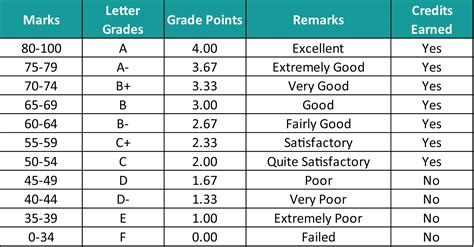Southern New Hampshire University (SNHU) employs a standardized grading scale to assess student performance in its online and on-campus programs. This comprehensive guide will provide an in-depth understanding of SNHU’s grading scale, its implications for student success, and strategies for achieving optimal course outcomes.

SNHU Grading Scale
| Letter Grade | Percentage Range |
|---|---|
| A | 94-100% |
| A- | 90-93% |
| B+ | 87-89% |
| B | 84-86% |
| B- | 80-83% |
| C+ | 77-79% |
| C | 74-76% |
| C- | 70-73% |
| D+ | 67-69% |
| D | 64-66% |
| D- | 60-63% |
| F | Below 60% |
Implications for Student Success
The SNHU grading scale serves as a benchmark for student performance and provides a clear understanding of the expectations for academic achievement. Students can use this scale to gauge their progress, identify areas for improvement, and develop effective study strategies. The scale also allows faculty to communicate performance levels effectively and consistently across different courses and programs.
Strategies for Optimal Outcomes
To achieve optimal course outcomes and reach their academic goals, students should:
- Set Clear Goals: Establish specific, measurable, achievable, relevant, and time-bound (SMART) goals for each course.
- Manage Time Effectively: Plan a schedule that allocates sufficient time for studying, completing assignments, and attending classes.
- Engage Actively in Class: Participate in discussions, ask questions, and actively engage with course material to enhance understanding.
- Seek Help When Needed: Do not hesitate to reach out to professors, teaching assistants, or academic support services if they require assistance.
- Study Consistently: Dedicate regular time to studying, reviewing notes, and revising material to reinforce learning.
- Complete Assignments Carefully: Read assignment instructions thoroughly, conduct thorough research, and present work in a well-organized and polished manner.
- Use Grading Rubrics: Pay attention to grading rubrics and ensure that assignments meet specific criteria and expectations.
- Self-Assess Regularly: Reflect on progress, identify strengths and weaknesses, and adjust study strategies accordingly.
Common Mistakes to Avoid
To avoid potential pitfalls and improve academic performance, students should:
- Avoid Cramming: Spread out studying over time to retain information effectively.
- Don’t Ignore Deadlines: Submit assignments on time to avoid penalties.
- Plagiarize: Cite sources accurately and avoid using others’ work without proper attribution.
- Overestimate Their Performance: Be realistic about progress and seek help if needed to avoid surprises.
- Rely Solely on Class Notes: Supplement class notes with additional research, readings, and study materials.
- Neglect Active Participation: Engage in class discussions, ask questions, and participate in group projects to demonstrate understanding.
- Ignore Feedback: Pay attention to feedback from professors and teaching assistants and use it to improve performance.
Tips and Tricks
To enhance their learning experience, students can implement these tips:
- Set Up a Dedicated Study Space: Create a quiet and distraction-free environment for studying.
- Use Highlighting and Note-Taking: Identify key concepts and write down summaries to reinforce understanding.
- Review Regularly: Schedule regular time to review notes, flashcards, and important course material.
- Create Study Groups: Collaborate with classmates to discuss course topics, share insights, and quiz each other.
- Use Online Resources: Leverage SNHU’s online library, databases, and tutoring services to enhance knowledge.
- Set Realistic Goals: Break down large tasks into smaller, manageable chunks to avoid feeling overwhelmed.
- Reward Success: Celebrate achievements and milestones to stay motivated.
- Take Breaks: Step away from studying at regular intervals to rest and recharge.
- Ask for Help: Do not hesitate to reach out to professors, TAs, or academic support services if they require assistance.
Conclusion
The SNHU grading scale provides a clear framework for student assessment and supports academic success. By understanding the scale, implementing effective study strategies, and avoiding common mistakes, students can maximize their potential, achieve their academic goals, and embark on a path to personal and professional growth.
